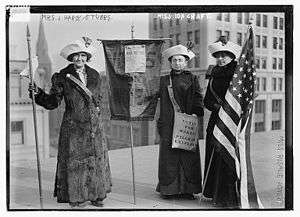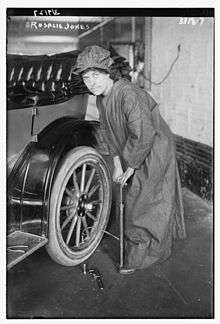Rosalie Gardiner Jones

Jones, with fellow suffragettes Jessie Stubbs and Ida Craft, circa 1912-1913

Jones, circa 1910-1915
Rosalie Gardiner Jones (February 24, 1883 - February 1978) was an Oyster Bay socialite and suffragist known as "General Jones".[1] She took part in the 1913 Suffrage Hike.[2]
Biography
Jones was born in 1883 to Mary and Oliver Livingston Jones. She graduated from Adelphi College, then a women's school in Brooklyn, and later graduated from Brooklyn Law School.[1] Jones married Washington Senator Clarence Dill, who sought a divorce from her in 1936; Dill claimed that Jones told his friends that he was "a political coward" for not seeking re-election in 1934, and that she buried dogs and garbage in the backyard.[3]
See also
References
- 1 2 "A Pioneer for Female Power". Newsday. Archived from the original on December 15, 2007. Retrieved 2009-07-29.
Jones' wealthy parents were Mary and Oliver Livingston Jones, whose main address was on East 72nd Street, but whose summer place was a 1783 home on a huge spread on Cold Spring Road in what is now Laurel Hollow in Oyster Bay. For many years the property was referred to as being located in Cold Spring Harbor. Born in 1883, Jones was educated at Adelphi College, then a women's school in Brooklyn, and later graduated from Brooklyn Law School. Entering the suffrage movement at age 28, Jones, along with a few friends, found herself attracted to the more militant feminists in London who called themselves "suffragettes, rather than the then more genteel American "suffragists. She joined forces with Harriet Stanton Blatch, the daughter of Elizabeth Cady Stanton, a founder of the suffrage movement.
- ↑ "Col. Craft Walks On, But Hikers Protest. Her Feet Swollen So Badly That She Falls Behind Companions -- Says "I Am Going Through."" (PDF). New York Times. February 23, 1913. Retrieved 2009-07-29.
Gen. Rosalie Jones, in command of the suffragist hikers, changed the army's schedule once to-day, and then she changed it back again. Early in the day, although the pilgrims were walking over bad roads under a sullen downpour of rain, the General said that from this town tomorrow the pilgrims would proceed to Baltimore, twenty-six miles away.
- ↑ Time, "Milestones," April 13, 1936
This article is issued from Wikipedia - version of the 9/30/2016. The text is available under the Creative Commons Attribution/Share Alike but additional terms may apply for the media files.